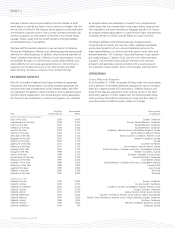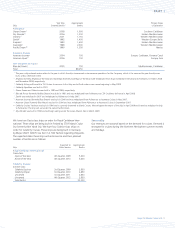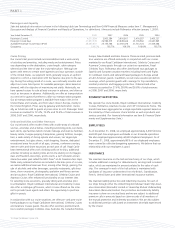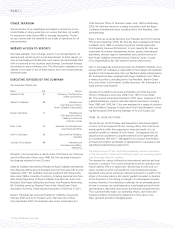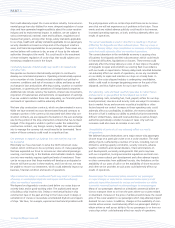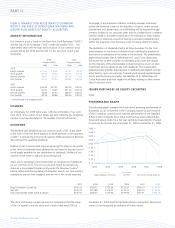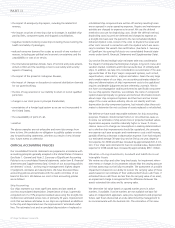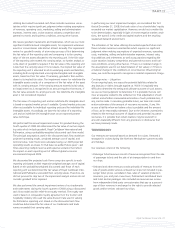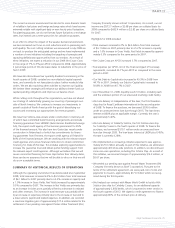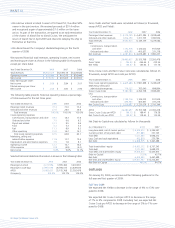Royal Caribbean Cruise Lines 2008 Annual Report Download - page 33
Download and view the complete annual report
Please find page 33 of the 2008 Royal Caribbean Cruise Lines annual report below. You can navigate through the pages in the report by either clicking on the pages listed below, or by using the keyword search tool below to find specific information within the annual report.
Royal Caribbean Cruises Ltd. 17
PART I
Changes or disruptions to external distribution channels for our guest
bookings could adversely affect our results of operations.
We rely on travel agencies to generate the majority of bookings for our
ships. If the current worldwide economic downturn continues for an
extended period of time or worsens, these agencies could be adversely
impacted and significant disruptions or contractions could occur to
these businesses. This could reduce the distribution channels available
for us to market and sell our cruises. If this were to occur, it could have
an adverse impact on our financial condition and results of operations.
The loss of key personnel or our inability to recruit or retain qualified
personnel could adversely affect our results of operations.
Our success depends, in large part, on the skills and contributions of
key executives and other employees, and on our ability to recruit and
retain high quality employees. We must continue to recruit, retain
and motivate management and other employees sufficient to main-
tain our current business and support our projected growth. A loss
of key employees could adversely affect our results of operations.
A change in our tax status under the United States Internal Revenue
Code, or other jurisdictions, may have adverse effects on our income.
We and a number of our subsidiaries are foreign corporations that
derive income from a United States trade or business and/or from sources
within the United States. Drinker Biddle & Reath LLP, our United States
tax counsel, has delivered to us an opinion, based on certain represen-
tations and assumptions set forth in it, to the effect that this income,
to the extent derived from or incidental to the international operation
of a ship or ships, is exempt from United States income tax pursuant to
Section 883 of the Internal Revenue Code. We believe that most of our
income (including that of our subsidiaries) is derived from or incidental
to the international operation of a ship or ships.
It should also be noted that the provisions of Section 883 are subject
to change at any time by legislation. Moreover, changes could occur
in the future with respect to the identity, residence or holdings of our
direct or indirect shareholders, or relevant foreign tax laws, that could
affect our eligibility for the Section 883 exemption. Accordingly, there
can be no assurance that we will continue to be exempt from United
States income tax on United States source shipping income in the future.
If we were not entitled to the benefit of Section 883, we and our sub-
sidiaries would be subject to United States taxation on a portion of
the income derived from or incidental to the international operation
of our ships, which would reduce our net income. See Taxation of the
Company above for a discussion of such taxation in the absence of an
exemption under Section 883.
Finally, changes in the income tax laws affecting our operations in Malta,
the United Kingdom or elsewhere could result in higher income taxes
being charged against our operations, resulting in lower net income.
We are controlled by principal shareholders that have the power
to determine our policies, management and actions requiring
shareholder approval.
As of February 12, 2009, A. Wilhelmsen AS., a Norwegian corporation
indirectly owned by members of the Wilhelmsen family of Norway,
owned approximately 20.1% of our common stock and Cruise Associ-
ates, a Bahamian general partnership indirectly owned by various trusts
primarily for the benefit of certain members of the Pritzker family and
a trust primarily for the benefit of certain members of the Ofer family,
owned approximately 15.6% of our common stock. A sale of shares
by A. Wilhelmsen AS. or Cruise Associates could cause a drop in our
share prices.
A. Wilhelmsen AS. and Cruise Associates are parties to a shareholders’
agreement and have the power to determine, among other things
our policies, the persons who will be our directors and officers, and
actions requiring shareholder approval. The shareholders’ agreement
provides that our board of directors will consist of four nominees of
A. Wilhelmsen AS., four nominees of Cruise Associates and our Chief
Executive Officer.
During the term of the shareholders’ agreement, certain corporate
actions require the approval of at least one director nominated by
A. Wilhelmsen AS. and one director nominated by Cruise Associates.
Our principal shareholders are not prohibited from engaging in a busi-
ness that may compete with our business, subject to certain exceptions.
If any person other than A. Wilhelmsen AS. and Cruise Associates, our
two principal shareholders, acquires ownership of more than 30% of
our common stock and our two principal shareholders, in the aggre-
gate, own less of our common stock than such person and do not
collectively have the right to elect, or to designate for election, at least
a majority of the board of directors, we may be obligated to prepay
indebtedness outstanding under the majority of our credit facilities,
which we may be unable to replace on similar terms. If this were to
occur, it could have an adverse impact on our liquidity and operations.
We are not a United States corporation and our shareholders may
be subject to the uncertainties of a foreign legal system in protecting
their interests.
Our corporate affairs are governed by our Restated Articles of Incor-
poration and By-Laws and by the Business Corporation Act of Liberia.
The provisions of the Business Corporation Act of Liberia resemble
provisions of the corporation laws of a number of states in the United
States. However, while most states have a fairly well developed body
of case law interpreting their respective corporate statutes, there are
very few judicial cases in Liberia interpreting the Business Corporation
Act of Liberia. As such, the rights and fiduciary responsibilities of direc-
tors under Liberian law are not as clearly established as the rights and
fiduciary responsibilities of directors under statutes or judicial precedent
in existence in certain United States jurisdictions. For example, the right
of shareholders to bring a derivative action in Liberian courts may be
more limited than in United States jurisdictions. There may also be
practical difficulties for shareholders attempting to bring suit in Liberia
and Liberian courts may or may not recognize and enforce foreign
judgments. Thus, our public shareholders may have more difficulty
in protecting their interests with respect to actions by management,
directors or controlling shareholders than would shareholders of a
corporation incorporated in a United States jurisdiction.
Litigation, enforcement actions, fines or penalties could adversely
impact our financial condition or results of operations and/or
damage our reputation.
Our business is subject to various United States and international laws
and regulations that could lead to enforcement actions, fines, civil or
criminal penalties or the assertion of litigation claims and damages. In
addition, improper conduct by our employees or agents could damage
our reputation and/or lead to litigation or legal proceedings that could
result in civil or criminal penalties, including substantial monetary fines.
In certain circumstances it may not be economical to defend against
such matters and/or a legal strategy may not ultimately result in us
prevailing in a matter. Such events could lead to an adverse impact
on our financial condition or results of operations.



